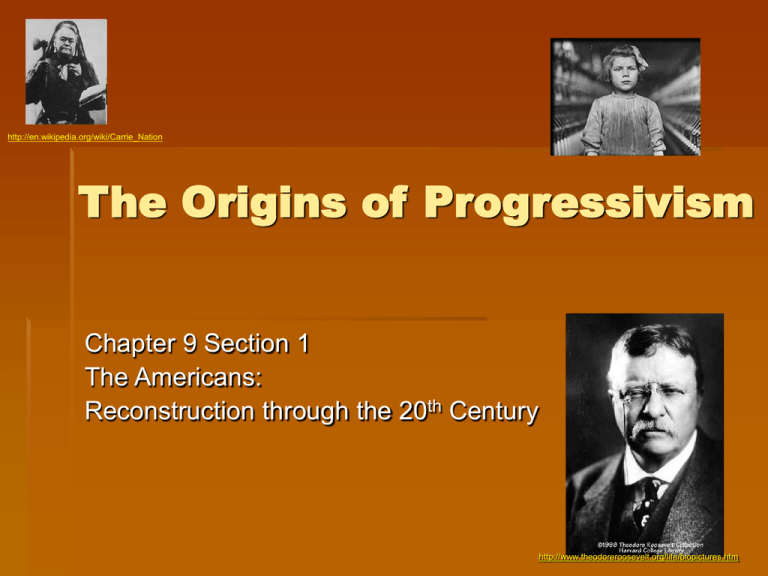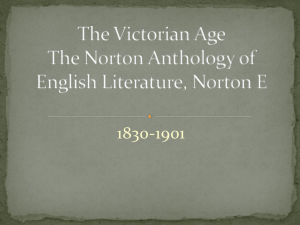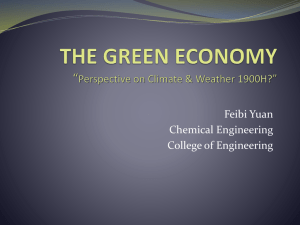The Origins of Progressivism
advertisement

http://en.wikipedia.org/wiki/Carrie_Nation The Origins of Progressivism Chapter 9 Section 1 The Americans: Reconstruction through the 20th Century http://www.theodoreroosevelt.org/life/biopictures.htm Sources of Progressive Reform A. Industrialization, with all its increase in productivity and the number of consumer goods, created 1) Unemployment and labor unrest 2) Wasteful use of natural resources 3) Abuses of corporate power B. Growing cities magnified problems of poverty, disease, crime, and corruption C. Influx of immigrants and rise of new managerial class upset traditional class alignments D. Massive depression (1893-1897) convinced many that equal opportunity was out of reach for many Americans. http://home.earthlink.net/~gfeldmeth/lec.prog.html Who Were the Progressives? A. New middle class composed of young professionals 1. Sought to apply principles of professions (medicine, law, business, teaching) to problems of society 2. Strong faith in progress and the ability of educated people to overcome problems 3. Rise in volunteer organizations organized to address issues (American Bar Association, U.S. Chamber of Commerce, National Association for the Advancement of Colored People, National Municipal League, eg.) 4. Mainly urban in residence and orientation B. Muckraking journalists attacked corruption and scandal with a sense of moral outrage 1. Lincoln Steffens exposed city machines in The Shame of the Cities (1904) 2. Ida Tarbell exposed Standard Oil Trust abuses 3. Upton Sinclair's The Jungle (1906) attacked the meat-packing industry C. Political reformers (many opposed to traditional party politics) D. Socialists--frustrated workers who promised to destroy capitalism. Led by Eugene Debs (who polled 900,000 votes for president in 1912), socialists were rejected by most Progressives as too extreme in their goals and methods http://home.earthlink.net/~gfeldmeth/lec.prog.html Progressive Movement Aim was to return control of government to the people, restore economic opportunities, and correct injustices in American Life. Many different opinions on both the problems of society and the solutions. 4 Goals of Progressivism Protect Social Welfare Promote Moral Improvement Create Economic Reform Foster Efficiency Protecting Social Welfare YMCA – Young Men’s Christian Association Libraries Classes Swimming Pools Handball Courts Salvation Army Soup Kitchens Daycares Slum Brigades to convert poor immigrants to middle-class values and temperance. Women Reformers (See Next Slide) Florence Kelley Women Christian Temperance Union Florence Kelley Advocate for improving the lives of women and children Chief Inspector of Factories (Illinois) Won passage of Illinois Factory Act 1893 Prohibited child labor and limited women’s working hours Model for other states http://www.boisestate.edu/SOCWORK/DHUFF/history/extras/kelly.htm Promoting Moral Reform Prohibition the banning of alcoholic beverages Women Christian Temperance Union Entered saloons – sang, prayed, and urged saloonkeepers to stop selling alcohol Largest women’s group in nation’s history Motto – “Do Everything” Opened Kindergartens Visited inmates in prison Worked for suffrage for women Anti-Saloon League http://www.spartacus.schoolnet.co.uk/USAsaloon.htm http://www.wctu.org/ Opposition to Prohibition Conflict with immigrant groups Saloons served several roles for immigrant groups Inexpensive meals Cashed paychecks Provided rooms for meetings and gatherings http://www.encyclopedia.chicagohistory.org/pages/1110.html Carrie Nation Worked for prohibition by walking into saloons, scolding customers, and using her hatchet to destroy the bottles of liquor. Lived in Kansas See link to the right for more information. http://www.kshs.org/exhibits/carry/carry1.htm Creating Economic Reform Laissez-Faire Theory Denounced Belief that the government should leave the economy alone Socialism An economic system in which the government owns most of the means of production. Goal is for the government to reduce inequality. Involves government regulation of business. Problem: Monopolies Socialism Grows Eugene V. Debs “Competition was natural enough at one time, but do you think you are competing today? Many of you think you are competing. Against whom? Against Rockefeller? About as I would if I had a wheelbarrow and competed with the Santa Fe railroad from here to Kansas City.” http://en.wikipedia.org/wiki/Eugene_V._Debs FROM - Debs: His Life, Writings and Speeches Muckrakers Journalist who wrote about the corrupt side of business and public life in mass circulation magazines. Ida M. Tarbell History of Standard Oil Company (see pg. 326) Described the companies cut-throat business practices. Upton Sinclair and Lincoln Steffens See info on them later in section http://en.wikipedia.org/wiki/Ida_M._Tarbell Fostering Efficiency http://en.wikipedia.org/wiki/Fordism Fredrick Winslow Taylor Scientific Management (Taylorism) http://en.wikipedia.org/wiki/Frederick_Winslow_Taylor Effort to improve efficiency in the workplace by applying scientific principles to make tasks simpler and easier. Studied factory operations to see how quickly each task could be performed. Assembly Line Ford Motor Company and Henry Ford http://en.wikipedia.org/wiki/Fordism Henry Ford http://en.wikipedia.org/wiki/Henry_Ford Assembly Line – huge increase in production Problems with Assembly Line Process Required people to work like machines, thus there was a high turn-over rate Injuries and worker exhaustion trying to keep up the pace “Five Dollar Day” and 8 hour work day employed to keep workers happy and reduce strikes. (Unheard of pay scale at that time.) Clean Up Government Political Machine Politics / Corruption Inefficiency in Government Government not responsive to the electorate Reforming Local Government Mayor / City Council Form Commission Form Council – City Manager Form Reform Mayors Hazen Pingree – Detroit Tom Johnson – Cleveland Gas and Water Socialism – public ownership of utilities Reform at the State Level Reform Governors Robert M. La Follette / attacked the railroads James S. Hogg Protecting Workers Keating – Owen Act 1916: prohibited the transportation of goods produced with child labor across state lines. (DECLARED UNCONSTITIONAL because it interfered with interstate commerce.) State level reforms suceeded in banning child labor and setting maximum hours in almost every state. Efforts to Limit Working Hours Muller v. Oregon Bunting v. Oregon Workers Compensation Reform at the State Level Reform Elections Secret Ballot (Australian Ballot) Initiative - bill originated by the people rather than lawmakers. Referendum – vote on an initiative. Recall – enabled voters to remove public officials from elected positions by forcing them to face another election before the end of their term if enough voters ask for it. Direct Primary – voters choose candidates for public office through special popular election. Direct Election of Senators 17th Amendment (1913) – Popular election of U.S. Senators





